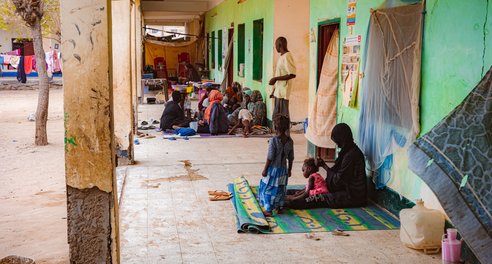The new Integrated Food Security Phase Classification Partnership (IPC) report released confirms that famine is persisting in Sudan, with a high risk of it further expanding in the weeks to come.
Sudan’s crisis is neither new nor unexpected. The IPC and humanitarian organizations have been warning of the shocking escalation of hunger and starvation in Sudan since the conflict began in April 2023, carrying one key demand: act now to end this preventable suffering. Yet, this repeated call has gone unheeded. For 900 days now, Sudanese communities have endured unthinkable violence, mass displacement, and starvation.
Deepmala Mahla, CARE’s Chief Humanitarian Officer, said:
“It is deeply disheartening to see yet another report on the worsening of starvation while meaningful action to address it remains elusive. A desperate search for even the most basic food, sometimes just a handful of grain, is a daily reality for many people across Sudan. In too many parts of the country, including Darfur and Kordofan, families resort to boiling leaves as their only source of sustenance – a grim measure of desperation that has become distressingly common. We and others have been sounding the alarm on this terrible situation for years. What will it take for the international community to act and end this cycle of catastrophic suffering? Lives that could be saved are slipping away due to this inaction.”
Sudan remains the world’s largest hunger, protection and displacement crisis, with over 30 million people in urgent need of humanitarian assistance and more than 10 million displaced internally. It’s also the site of a relentless war on women and girls, who face the continuous threat of systematic conflict-related sexual violence.
The IPC report confirms famine in El Fasher town and Kadugli. It further identifies a risk of famine in 20 localities across greater Darfur and greater Kordofan states through January 2026. Since the December 2024 IPC analysis, some areas of eastern Sudan have shown signs of recovery as conflict abated, but escalating violence in Greater Darfur and Kordofan is deepening the crisis.
Starvation is most severe primarily in locations where armed actors have obstructed both civilian movement and humanitarian access and conduct deliberate attacks on civilians and civilian infrastructure essential to sustain life. The recent atrocities in and around El Fasher, North Darfur, demonstrate the severity of violations being committed. The siege of El Fasher, that started nearly 18 months ago, has cut off people from humanitarian aid.
Civilians continue to be trapped inside the city, facing unacceptable violence in violation of international humanitarian law, with reports of summary executions, arbitrary detentions, and attacks on civilians. The journey to flee is perilous and fraught with severe risks, including lack of safe passage – with many facing detention, abuse and targeted violence along escape routes. Alarmingly, only a fraction of those who manage to flee make it to safer areas. Testimonies from people arriving in Tawila, North Darfur, about 60 kilometers from El Fasher, are horrifying. Most people, mostly women and children, arrive with nothing but the clothes they wear, and are in need of everything – exhausted, traumatized, dehydrated and starved. Tawila is already hosting over 652.000 internally displaced people. The situation on the ground is chaotic as aid actors' resources are deeply insufficient.
Global aid cuts have further weakened the humanitarian response and overstretched its resources. Among the many devastating consequences of the international community’s retreat in Sudan, thousands of mutual aid groups, organized by unwavering Sudanese volunteers, have been forced to shut down for lack of funding.
In addition to El Fasher, several other areas – including the localities of Kadugli and Dilling in South Kordofan – are also of critical concern as they continue to face sieges and risk a similar scenario.
“We now need to turn words into action. The international community needs to act, now, decisively and in unity. Civilians urgently need protection. Atrocities and indiscriminate attacks against civilians and civilian infrastructure must end now. Civilians must be able to flee areas of conflict safely and in dignity, without extortion or attack, and have immediate and safe access to humanitarian assistance. To respond to the catastrophic humanitarian needs, and avert further spread of starvation, humanitarian organisations need safe and unrestricted access to all areas of Sudan, especially those with the greatest needs. People need a full-scale life-saving response now.” said Deepmala Mahla, CARE’s Chief Humanitarian Officer.
Media enquiries
For media enquiries, please contact us on press.uk@careinternational.org



